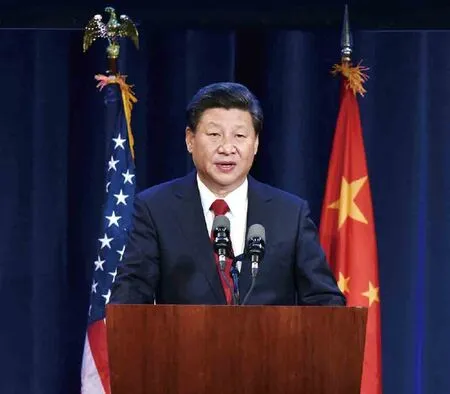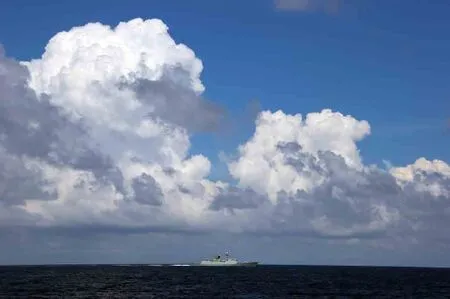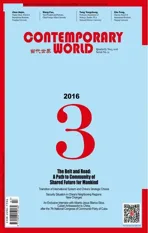“Thucydides Trap” and China-US Relations
2016-09-20XUQiYUAssociateResearchFellowandDeputyDirectorInstituteofStrategicStudiesPLANationalDefenseUniversity
XU QiYUAssociate Research Fellow and Deputy-Director,Institute of Strategic Studies, PLA National Defense University
“Thucydides Trap” and China-US Relations
XU QiYU
Associate Research Fellow and Deputy-Director,
Institute of Strategic Studies, PLA National Defense University

President Xi Jinping noted that “Mutual benefit is the defining feature of China-US exchanges andcooperation” when he was attending the Welcoming Luncheon Hosted by Washington State Government and Friendly Organizations in Seattle.
THE ORiGiN oF “THUcYDiDEs TRAp”
On the Peloponnesian War between Athens and Sparta of the 5th century BC, the ancient Greek historian Thucydides summarized the origin of the war into a famous sentence, “What made war inevitable was the growth of Athenian power and the fear which this caused in Sparta”. Referred to repeatedly throughout later generations, this judgment has beentaken for an important law of history to interpret the rise of a power and the war between powers, becoming a special context. More often than not, to mention Thucydides implies a zero-sum game between the rising power and the status quo power and the ultimate, inevitable large-scale confrontation between them. However, the great difference between circumstances now and then is generally overlooked.
In face of rapid increase of China’s national strength and growing protrusion of structural contradictions between China and the US, Professor Graham Allison of Harvard University published an article on the Britishnewspaperthe Financial Times titled“Avoiding Thucydides Trap”, using the term “Thucydides trap” for the first time. In the article, by “Thucydides trap” Allison refers to the danger from competition between the rising power and the status quo power. The article draws two conclusions: first, the prospects of China-US relations after the rise of China are not optimistic, the main ground of which is historical experience, that in the past 1500 years most of the cases of the rise of powers have ended in wars; and second, the purpose of putting forward “Thucydides trap” is not to say the pessimistic diagnosis is not unavoidable, or to say that “national leaders are prisoners of the iron law of history”, but to understand the arduousness of challenges in face of both countries. Therefore, both China and the US should more frankly discuss all possible confrontation and hotspots and make self-readjustment according to the core interest of one another.
The notion “Thucydides trap” was put forward when tensions occurred in China-US relations over the issue of South China Sea and in China-Japan relations over the issue of East China Sea. In fact, since the Obama Administration came up with the Rebalancing Strategy for the Asia-Pacific, the antagonistic contradictions between China and the US have been on the increase. Academics of both countries have had concerns about the prospects of China-US relations, some of them starting to explore how to reduce distrust between the two countries. For instance,“Addressing U.S.-China Strategic Distrust” co-authored by Chinese scholar Wang Jisi and American scholar Kenneth Lieberthal represents such a tendency. In connotation, “Thucydides trap” carries forward such views, but what makes it different is the powerful traditional context it invokes, with more historical weight and even historical fatalism and thus the graveness of the challenges in face of China-US relations is more thoroughly illustrated.
REspoNsEs, CoNTEsTs AND MisplAcEMENTs oF “THUcYDiDEs TRAp”
Upon its proposition, “Thucydides trap” has aroused attention of political and academic circles. Robert Zoellick,former President of the World Bank,published an article on the magazine the National Interest tiled “The United States, China and Thucydides: How can Washington and Beijing avoid typical patterns of distrust and fear?”Zheng Yongnian, Professor and Director of East Asian Institute, National University of Singapore, also published an article titled “How can China and the United States escape ‘Thucydides trap’”. These articles are basically in agreement with the proposition of“Thucydides trap”, focusing on policy proposals as to how to avoid China and the United States hitting the beaten track of power struggle in history. In political circle and among policy makers in particular feedback to “Thucydides trap” in general is positive. On the Chinese side, Chinese President Xi Jinping gave an exclusive interview to American newspaper the World Post in 2014 when he openly used the notion“Thucydides trap” and said that both China and the United States should try to avoid falling into “Thucydides trap”,demonstrating that China attachesimportance to lessons of other rising powers in history and will firmly stick to the road of peaceful development. Since then, Xi Jinping has, on several occasions, noted “Thucydides trap”. In China’s diplomatic discourse, the“new type of major-country relations”called for by Xi Jinping is nothing but a solution to “Thucydides trap”, the two notions being both opposite and complementary. On the American side, the Obama Administration also emphasizes that the US and China will not fall into “Thucydides trap”.

On November 20, 2015, Seattle,Washington, the US and China cooperate in the 3rd humanitarian rescue and disaster mitigation exercise. It is the implementation of the important consensus reached between the two heads of the states,playing an active role in deepening the cooperation in the field of nontraditional security,such as humanitarian relief for disaster reduction.
However, in academic circle the notion has always been questioned. Particularly, the commemoration of the centennial of the World War I put heat to the debate on “Thucydides trap”.[1]In both China and the US, quite a number of scholars have taken part in the debate, which boils down to three foci as the following.
Focus One, if “Thucydides trap” can be applied or not to the world today. Those who hold opposite views believe that as Thucydides made the judgment some two thousand years ago,the world today differs immensely from the past so much so that the notion of “Thucydides trap” for the rising power and the status quo power to head for likely conflict does not apply to the contemporary world. Andrew Erickson, Associate Professor at the US Naval War College, echoed this view at a US Congressional hearing when he said that “Thucydides trap” is “dated”,“belonging to trash heap of history”and furthermore it is used by the Chinese side. Therefore, the notion should be rejected in the discourse system of the US Government. In fact, quite a few Chinese scholars negate the applicability of “Thucydides trap” to the contemporary world. However, Professor Allison has held on to his ground and, as contradictions between China and the US intensify over the South China Sea and other issues, further points out that “ten years down the road, the possibility of a war to happen between the US and China is greater than what everyone realizes”.

On the issue of South China Sea, it is for China to defend its own important national interest whereas it is for the US to uphold its“credibility”or prestige among its regional allies, with little room for giving in for either side.
Focus Two, if the notion “Thucydides trap” is precise in academic terms. Upon its presentation, “Thucydides trap” has been judged by some of the scholar in strict and rigorous academicterms, questioning its reliability and precision. In his article titled “Beware of the trap of ‘Thucydides trap’”, James Holmes, Associate Professor at the US Naval War College summarizes the opposite opinions into four aspects,which being quite representative, are as follows, (1) Thucydides judgment on the Peloponnesian War should not be taken for an iron law of history, and development of history should take full account of the dynamic role of man; (2) this historical analogy is very improper, and if China and the US are taken for Athens and Sparta, then which one is Sparta and which one is Athens? In another word,as the US considers itself as the lead light of the Western civilization, psychologically it cannot accept the analogy between China and Athens, the very origin of the Western civilization;(3) the afterworld and particularly the history prior to the World War I contradicted Thucydides judgment, the US, Germany and Japanwere all rising powers but the development of their relations with the status quo power Great Britain was totally different; (4)in reality, there is possibility for conflict to happen between China and the US, but possibility is no necessity, the final outcome depending on the policy makers of both countries.
Focus Three, who should be responsible for “Thucydides trap”. Most of the American scholars believe that the rising power should bear more responsibility and exercise more self-control whereas the Chinese scholars stress that the status quo power should take up more responsibility. Besides, there are quite a few other scholars debating on if China and the US will get into such a trap.
From the responses and counter arguments to “Thucydides trap”, it can be noted that political circle takes it for an abstract notion of warning rather than summary of historical law, and therefore the responses of Chinese and American leaders, in fact,fit the notion’s nature of policy proposal. President Xi Jinping has time and again noted the notion, which is more of borrowing its special context to emphasize to the outside world China’s determination and confidence in peaceful development. In contrast, the foci of debate in academic circle are not all fitting to the original intent in coining the term “Thucydides trap”. As this author notes above, the notion of“Thucydides trap” is neither a forecast of the reality nor an academic conclusion in the true sense of the word, and therefore the relevance of the three foci of debate in academic circle is, in fact, less than solid, particularly the one on academic rigorousness being doubtfully misplaced.
THE SiGNiFicANcE oF “THUcYDiDEs TRAp” To CHiNA-US RElATioNs AND iTs LiMiTs
Therefore, the true significance of“Thucydides trap” is to give a warning, making the elite and the masses of the people clear and mindful of the challenges facing China-US relations. By reading the history, the rise of a power has never been smooth going and can never be. The rapid growth of its national strength and influence is more often than not seen by the status quo power as challenging. Such structural contradictions truly exist. More import, such contradictions and conflicts cannot simply attribute to the responsibility or “sinister intent” of either side. Under most of the circumstances, both sides act according to the principle of maximizing their own interest, resulting in likely misjudgment of the other side leading to escalation of tension, developing to typical “security dilemma”. Ultimately, it leads to strategic show-down of both parties.
Going in-depth in observing the development of China-US relations in the past few years, one can see that similar trends have already been in place. For instance, on the issue of South China Sea, it is for China to defend its own important national interest whereas it is for the US to uphold its “credibility” or prestige among its regional allies, with little room for giving in for either side. As the gap between the national strength of both countries narrows, standoff like this has more and more strategic bearings on a profound level, “contest of power”more easily sliding to “contest of will”. On the American side, the fear of China has got to a new high. In the past,the US used to believe that China’s integration into the international system was beneficial to the US in taking China into its orbit. However, such belief has been openly questioned recently. A report of the Council of Foreign Relations published in March 2015 observes that the US action since the 1970s to integrate China into the international system is a mistake, which has “no doubt helped China become the future adversary of the United States”. Its counter-measure is to re-divide the interest linkage between China and the US and to stop and even reverse the process of “integrating” China into the international system. In general,such an idea of excluding China from the international system lest China becomes too strong has become a policy option in the US. In reality, the Obama Administration has spared no efforts in advancing “Trans-Pacific Partnership Agreement” (TPP) and made some breakthrough there, which can be seen as an expression of such “China exclusion” from the international system. This tendency will, beyond doubt,corrode the most important foundation of China-US relations, the interest interdependence, which as such makes the task of preventing China and the US from moving toward confrontation more arduous and imperative.
Of course, one should not exaggerate the significance of “Thucydides trap” more than a warning. As some of the scholars point out, it does not and cannot cover all major changes of the world today. At present, the general posture of both competition and cooperation between China and the US remains unchanged. Antagonism between both countries on Asian-Pacific issues and on that of South China Sea in particular is remarkable and it is difficult to raise the degree of mutual trust there. However, the positions of the two countries are relatively close on global issues like non-proliferation and climate change, both taking up similar major-country responsibilities. On global issues, China and the US not only have extensive common interest but also quite large room for cooperation. Close cooperation between China and the US is a necessary link in resolving global issues.
[1] For American scholars viewpoints see Richard N. Rosecrance and Steven E. Miller, eds., The Next Great War? The Roots of World War I and the Risk of U.S.-China Conflict, Cambridge, MA: MIT Press, 2014.
杂志排行
Contemporary World的其它文章
- The Belt and Road: A Path to Community of Shared Future for Mankind
- Community of Shared Future for Mankind: Theoretic Significance and Practical Drive
- Transition of International System and China’s Strategic Choice
- Security Situation in China’s Neighboring Regions: New Changes
- Lancang-Mekong Cooperation: How Did It Emerge from All Multilateral Mechanism?
- Adjustment of EU Neighborhood Policy: From Value-Driven to Interest-Oriented
